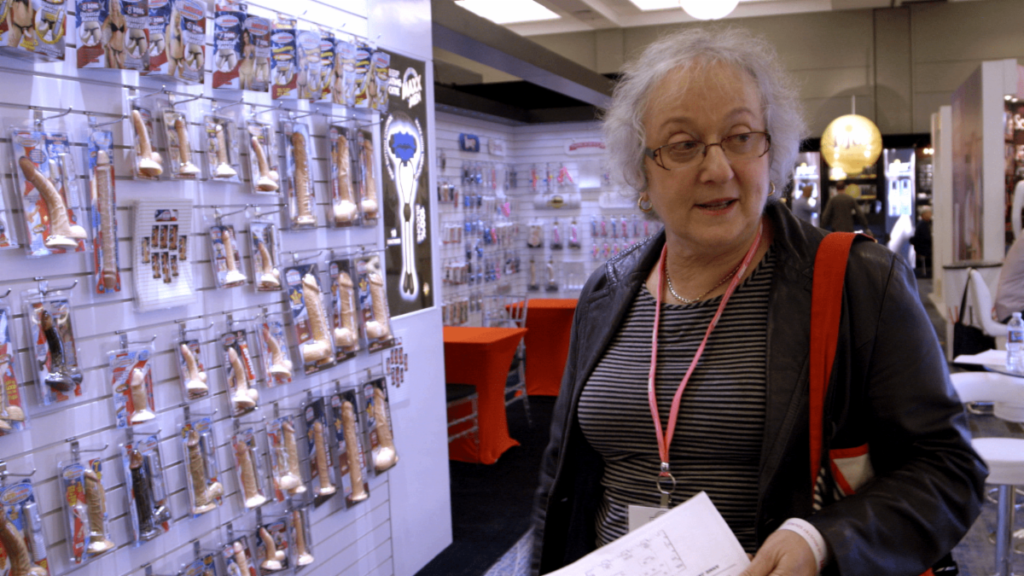Rachel Mason is a Los Angeles-based artist and director. Working across mediums as a songwriter, performer, sculptor, and multi-media artist, Mason’s work has appeared in shows at museums and galleries internationally. Mason’s first feature film, “The Lives of Hamilton Fish,” toured as a live performed concert. She wrote and recorded “Circus of Books'” end credit song, “Give You Everything.”
“Circus of Books” launches on Netflix tomorrow, April 22.
W&H: Describe the film for us in your own words.
RM: The film answers the questions that people have always asked me growing up: “What was it like to grow up with your parents owning Circus of Books?” It is a film about a store that was unique to the LGBT community and tells a piece of history which has yet to be written — the history of the role of gay porn in the development of the gay communities in Los Angeles.
It’s also a film about my family’s struggle with having this big secret.
W&H: What drew you to this story?
RM: This was a story that I knew I needed to share because the store had such a huge impact for so many people over so many years, and when the store was going to close, it was clear that I was the only person poised to document it, because my parents, the owners, are very private people and had no interest in having anyone film it.
I also wanted to really understand the depths of my parents’ involvement in the community that so respected them, when they have always been such outsiders to the community.
W&H: What do you want people to think about after they watch the film?
RM: I would love for people to think about what other stores have done for the communities around them, and about what other small pieces of history are yet to be written when you look at the vantage point of LGBTQ history.
I also would love to change attitudes around people in the porn industry. It is an industry with regular people who are just trying to make a living for the most part, and the amount of shame that is put on everyone is really ridiculous, especially since we all know that the numbers reflect mass consumption — so why should we shame it in the first place?
W&H: What was the biggest challenge in making the film?
RM: A big challenge was in wrangling my mom. As you see throughout the film, she fights me nearly the whole time. It was hard for her to understand that I was doing something important, and making a point that she was doing something important because she spent so many years hiding the story and downplaying their role in it.
W&H: How did you get your film funded? Share some insights into how you got the film made.
RM: The film started out with a fiscal sponsor and I had a really amazing executive producer, Gerry Herman, who generously put in the seed money to get the film started without me even having shot a single piece of footage. In two years I found an investor who specifically advocates for women directors, Rhianon Jones and her company Neon Heart Productions.
In the end, the film required more than I expected it would, and I had to pay some of my vendors on deferment.
W&H: What inspired you to become a filmmaker?
RM: I didn’t set out to become a filmmaker. I set out to become an artist, and I looked at the films as pretty much like any other large-scale art work that I had ever done.
What I’ve come to realize is that film is such a powerful medium in that it has the potential to reach so many people and to create dialogue, and I fell in love with the world of film festivals, and also realized how little I had connected with the art world. It wasn’t the best fit for me for the work I want to make.
W&H: What’s the best and worst advice you’ve received?
RM: Best advice: Levi Steinberg, a dear friend who lived to be 103 told me, “Enjoy your life.”
Worst advice: “You’re too old to make a career change at 40 when you’re a woman.” I have never been at a higher level with my career. My sense of clarity on my work and the opportunities that are coming to me now are much greater than any that came when I was younger.
Women are way too afraid of getting into their 40s and trying new things, and especially in the arts. My other major goal has always been to be in the music world, and that’s also something that is just starting for me.
W&H: What advice do you have for other female directors?
RM: Don’t let anyone tell you that you’re too old. That’s the biggest thing.
I also think the advice to “enjoy your life” should apply to everything and everyone at all time. Whatever it takes to just try to find joy and happiness even when life throws you lemons and things get messed up.
W&H: Name your favorite woman-directed film and why.
RM: I loved Sandi Tan’s “Shirkers.” It was a fascinating story about perseverance and a director who was completely thwarted but managed to make an amazing story out of it.
W&H: How are you adjusting to life during the COVID-19 pandemic? Are you keeping creative, and if so, how?
RM: I am spending time working on new pitches, scripts, and songs as much as possible, and also it’s giving me time with my son and partner, Buck Angel, and we are developing a podcast!







